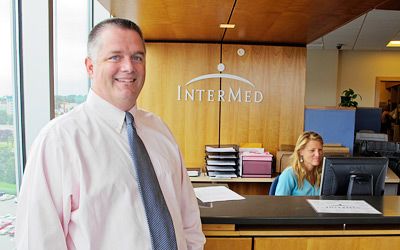InterMed expands to meet demand
 PAUL KOENIG
InterMed CEO Dan McCormack says that modernizing their Yarmouth facility gives the company room to grow.
PAUL KOENIG
InterMed CEO Dan McCormack says that modernizing their Yarmouth facility gives the company room to grow.
InterMed, the Portland-based health care provider, has expanded and revamped its Yarmouth Health Center with 10,000 more square feet of administrative offices, examination rooms and a full physical therapy gym.
Bringing together family practice physicians who were on different floors was the driving force behind the upgrade, according to InterMed CEO Dan McCormack, who says modernizing the facility also gives the company room to grow.
InterMed has already seen growth in its physical therapy business as a result of the improved gym on the second floor of the Yarmouth facility, and McCormack says they may need to add staff to accommodate the demand for services. The updated 25,000-square-foot facility at 259 Main St. houses family medicine, pediatrics, physical therapy and a recently-hired ob/gyn physician.
"The addition really affords us some growth and puts us in a position of not likely looking for more space later," says McCormack.
The for-profit health care company, owned and operated by doctors, also has locations in Portland and South Portland.
InterMed prefers to keep its focus on primary care while working with specialists to improve patients' overall care. For example, McCormack says that since an allergist practice now rents space in their Yarmouth facility two days a week, InterMed doesn't have to hire its own allergist in order to serve their patients going to Yarmouth.
"We have found that, more and more, our patients want everything under one roof," says McCormack.
Most of InterMed's 70 physicians are located in the Portland facility at 84 Marginal Way, a staff which includes doctors in internal medicine, infectious disease, obstetrics and gynocology, pediatrics and the surgery center.
The facility, built in 2008, was designed with an operations-management perspective to provide medical care efficiently. As a result, the different practices are set up with a centralized pod that includes the clinical support staff like nurses and medical assistants, with examination rooms surrounding the pods. The Yarmouth expansion follows a similar layout.
InterMed became a company in 1993 through the merger of three internal medicine practices from Portland and South Portland who saw an advantage in controlling costs and risk as the popularity of managed health care plans grew. "It's hard to be a small practice," says McCormack, commenting on the amount of infrastructure needed to succeed in the delivery of modern health care. He says it's important for InterMed to find efficiencies, especially in economies of scale. "Fortunately we have the size that we can make it on our own."
InterMed's revenues grew 30% from 2007 to 2011, which closely mirrors the number of doctors added in that time period -- about a third more. McCormack describes InterMed's growth as slow and steady in terms of revenue and adding doctors and patients. The number of doctors has grown by a third in the last five years who now serve around 65,000 primary care patients. At one point, an adult primary care doctor had a waiting list of 500. Although there's no longer a waiting list, most of the physicians have full patient loads, and McCormack says they could hire a few more doctors immediately.
"From a patient perspective, I hate the idea that we can't accommodate the patients who want to come in," says McCormack.
InterMed's greatest challenge is a lack of primary care doctors — a problem not unique to InterMed, or even Maine. The Association of American Medical Colleges projects a national shortage of more than 62,000 physicians in 2015 with the passing of the Affordable Care Act, and expects that number to double by 2025.
"I do think the demand for primary care is going to outstrip the supply for the foreseeable future," says McCormack, noting that previously uninsured Americans will be looking for primary care physicians now.
Part of InterMed's struggle for new doctors stems from its Maine location. Fewer residency programs in the area forces InterMed to look outside of Maine for prospective doctors. Doctors sometimes choose residencies based on where they want to settle, so McCormack says it's difficult to convince them to uproot again and move to Maine after a residency elsewhere.
He says the doctors also often have concerns about whether their spouse will be able to find a job in the area.
"I think that's always going to be an issue," he says. "Does the market support a family, too?"
InterMed directs prospective employees to Portland's 2 Degrees program — an initiative from the nonprofit LiveWork that provides a network of contacts from various fields who are accessible to people moving to the Portland area.
InterMed also needs to prepare for retirements in the next five to 10 years, says McCormack, but there could be help on the way.
The first students from the Maine Medical Center and Tufts University School of Medicine partnership program will graduate next spring. The program saves 20 seats in each class for Maine students and provides scholarship support. The hope for InterMed is that graduating students choose Maine Medical Center for their residencies and want to stay in the area after completing the training -- a three-year process if the students choose internal medicine or family practice. Although it's still four years out before the graduates look for jobs, McCormack is hopeful they will want to stay in their home state.
"That is a positive thing on the horizon," he says.










Comments